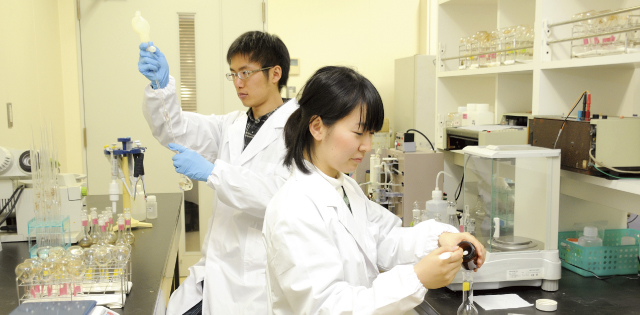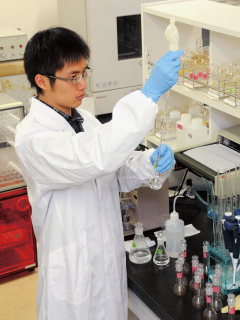
Earth and Environmental Sciences
The department of earth and environmental sciences promotes education and research from a global perspective through comprehensive understanding of the Earth, a place where human live and interact, which comprises of geosphere, hydrosphere, and biosphere. The department of earth and environmental sciences carry out research and education in order to understand the actual conditions of the natural environment and basic mechanism of fundamental changes that occur, emphasis is put particularly on the fields of geology, biology, and chemistry. Students are encouraged to conduct field work to directly observe the geosphere, hydrosphere, and biosphere.
We aim to foster human resources who can think flexibly and comprehensively, who possess not only highly advanced and specialized knowledge but a wide range of knowledge and learning which goes beyond the conventional realm of their academic fields.
Educational Goals (Philosophy) and Prospective Students
Our educational goal is to develop people with a good sense of ethics who can think flexibly and comprehensively and possess systematic knowledge of the natural environment. Prospective students should understand these educational goals and possess the basic academic ability to acquire a high level of specialized expertise through study and research.

Admission Policy
We aim to develop creative and professionals who understand the geosphere, hydrosphere, and biosphere from a comprehensive perspective, and possess the ability to make sound ethical judgments and can lead the world, with specialized knowledge of the earth, a place where we live.
Prospective Students
- Those who will advance scientific technology by using their specialized ability concerning the earth and environmental sciences from a broad perspective.
- Those who can positively work to construct a sustainable global community where nature and human beings coexist.
- Those who possess a deep reverence for the global scale on which humans interact with nature and the ability to work with that sense of reverence.
Course Work
◎Geological Science Course
Education and research fields: Understanding of Tectonic History from the Southwestern Japanese Arc to the Ryukyu Arc, Fossil Based Study of Biological Evolution, Concrete Analysis of the Earth’s Biosphere and Maintenance System of the Global Environment, Prevention of Landslide Disasters, Earthquakes and Volcanic Eruptions, Understanding of Plate Tectonics between the Kyushu Mainland and the Nansei Islands and Prediction of Earthquakes and Volcanic Eruptions.

◎Environmental Analysis Course
Education and research fields: Development of Highly Sensitive Analytical Methods for Measurement of Trace Substance such as Mercury that would affect the Environment and furthering the Understanding of the Chemical Forms of Trace Elements in the Environment (air, water, substratum, organisms) in the Field of Inorganic Analytical Chemistry; Study of Ion Dissolution Status and furthering this Material’s Chemical Reactions.

◎Biodiversity Course
Education and research fields: Ecological Studies of Land Based on Flora and Mollusks from Southwest Japan to Southeast Asia, Studies in Genetic Diversity on the Molecular and Cellular Levels, and Classification and Ecology of Benthic Organisms in Shallow and Freshwater Environments.
Curriculum
Research of the natural environment requires multiple approaches from various fields. Students are encouraged to study a different number of fields not limited to the particular field of their specialization. A total of 30 credits or more must be obtained. 16 must be from required classes and more than 6 credits are needed from elective classes related to the student’s selected course. Other credits should be obtained after consultations with a student’s respective faculty advisor in accordance with a student’s research field and chosen course.
List of faculty members
The following specialists provide research and education support to students and help find solutions to student academic issues.
